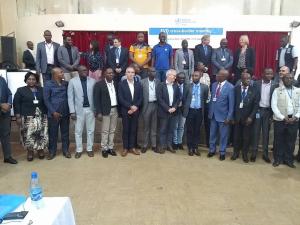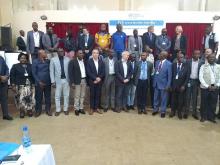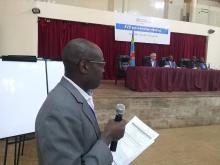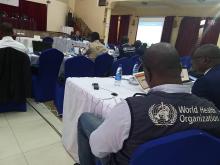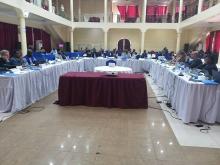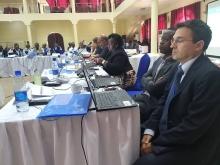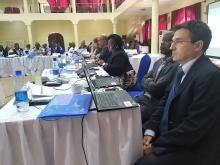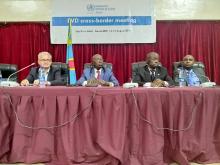Neighbouring countries to the Democratic Republic of Congo join forces to halt potential Ebola transmission at their borders
Goma, 16 August – Given the massive numbers of people moving across the borders between the Democratic Republic of the Congo (DRC) and its neighbouring countries and that four of those countries are at high risk of imported Ebola virus disease, more than 35 of their government representatives met in Goma this week to forge stronger collaboration to keep a potential case from crossing over.
The DRC has been immersed in an epidemic of Ebola in which more than 1 900 people have died since the outbreak began a year ago.
An estimated 80 000 people cross the border between Goma in northern DRC and the Rwandan city of Gisenyi each day, and 5 000 people traverse the Ugandan-DRC border, a number that can jump to 20 000 people on market days.
In the two-day meeting, the country representatives and partners, including David Gressly, the United Nations Emergency Coordinator for Ebola Response in Goma, agreed that, despite strengthened preparedness at national levels, human resource capacities at the district level are suboptimal, especially for coordination, surveillance, infection prevention and control, risk communication and community engagement.
The participants agreed on recommendations for a joint cross-border surveillance mechanism, including surveillance zones, as well as joint response protocols between the DRC and the neighbouring countries. Sharing of information between countries and districts must be improved in the cross-border surveillance zones to facilitate early detection, investigation and response needs to be as rapid as possible.
With partner organization assistance, the represented countries will develop a joint action plan with cross-border public health interventions for general heightened preparedness and for immediately following notification of a case. Other agreed measures address best practice exchange, regular joint trainings to build trust and share capacity in terms of personnel deployment and the medical countermeasures.
“Viruses do not recognize borders, so we cannot let borders limit our ability to minimize the impact of future outbreaks,” said Dr Peter Graaf, World Health Organization (WHO) Representative in DRC for Ebola response. “This meeting helped put in place mechanisms for close cross-border collaboration, which are not only key to a successful joint response to the current Ebola outbreak but will prove equally useful to ensure joint and coordinated disease surveillance and response in the region.”
The meeting concluded with participants also agreeing that a formal mechanism on collaboration and cooperation between the countries, real-time information sharing and reinforced surveillance in the districts bordering the DRC are imperative for working in solidarity and partnership. A joint monitoring mechanism for cross-border public health interventions and a high-level meeting are planned to foster political ownership and accelerate domestic resource mobilization. WHO and partners will continue to provide the countries with technical and financial support.



